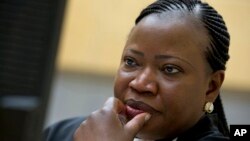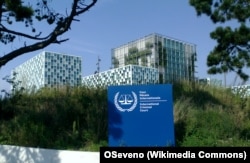The International Criminal Court's prosecutor voiced hope Thursday that the Trump administration would not withdraw its backing and called on supporters to rally to its cause to counter rising nationalism.
While the United States does not directly fund the ICC, Fatou Bensouda said losing U.S. cooperation to capture indictees would deal a blow to a court that depends on governments that have no enforcement powers of their own.
"It was significant to have U.S. cooperation," Bensouda told Reuters after meeting EU officials in Brussels. "I am just hoping that this will continue. ... We will see."
The Trump administration is preparing executive orders to reduce the U.S. role in international organizations, including the ICC, The New York Times reported Wednesday.
U.S. program
The United States is not a member of the ICC but has helped it pursue war criminals by extending its Rewards for Justice program, under which it pays for information leading to the arrest of suspects, to cover ICC indictees.
When a top rebel of Uganda's Lord's Resistance Army gave himself up to U.S. troops last year, the U.S. handed him over to the ICC, although it was under no obligation to do so.
But court supporters fear the leadership of Donald Trump, who has promised a less internationalist foreign policy, could embolden critics of the first permanent international war crimes tribunal.
It is already reeling from withdrawals by some of the African states that make up a third of its membership, many of which complain it unfairly targets Africans for prosecution.
In the face of mounting nationalism, Bensouda called on African and European countries to "be more vocal" in their support, saying the court sorely lacks resources.
"When increasingly international criminal justice is being challenged, it is this moment that the court needs its supporters," said Bensouda, a former Gambian justice minister. "This is critical for the court's existence."
Gambia, South Africa and Burundi notified the United Nations last year of their plans to withdraw from the ICC.
But Bensouda said she hoped her home country would reverse that decision following elections there. The withdrawals become effective one year after the notification is filed.
Russia leaving
Russia, which is not a member of the court but signed its founding Rome Statute, has said it will remove its signature, while the Philippines is considering withdrawing.
The prosecutor countered concerns about an exodus of members, saying those quitting the ICC wanted to shield themselves from the court's mandate to prosecute war crimes, genocide and crimes against humanity.
"With respect to withdrawal notifications, it is very difficult to divorce it from self-interest," Bensouda said.
Bensouda launched a preliminary investigation in Burundi in April after political violence claimed hundreds of lives and forced hundreds of thousands to flee abroad.
Despite challenges ranging from witness intimidation to attempts to politicize the court, Bensouda said the ICC's best defense was to continue pursuing perpetrators of atrocities.
"There are many, many challenges ... but we are not going to throw our hands in the air and say, 'That's it,' " Bensouda said. "I still believe it is a way to have a more just world, a more fair world."
The ICC, based in The Hague, was founded in 1998 as a court of last resort to intervene in member countries when national jurisdictions fail to prosecute mass atrocities.






